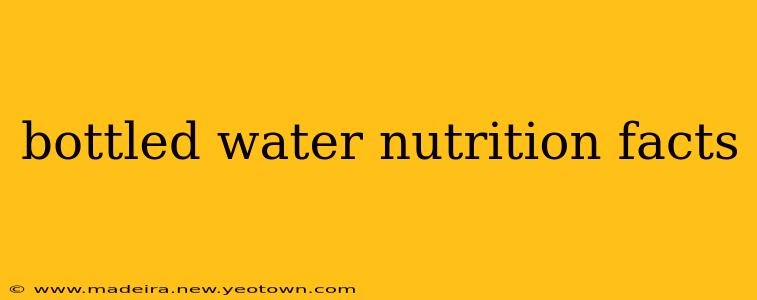Let's be honest, we all grab a bottle of water now and then. It's convenient, refreshing, and readily available. But have you ever really stopped to think about the nutritional facts – or lack thereof – in bottled water? It might seem simple, but there's more to it than meets the eye. This journey will explore the world of bottled water, delving into its nutritional content (or rather, the absence of it!), the potential contaminants, and answering some common questions you might have.
What are the nutritional facts of bottled water?
The short answer is: there aren't any significant nutritional facts. Pure, untreated bottled water contains virtually nothing but H₂O. No calories, no fat, no carbohydrates, no protein – it's essentially a blank nutritional slate. This is, of course, its primary appeal. We drink it for hydration, not for nutrients. However, the story doesn't always end there.
Does bottled water contain any minerals?
This depends entirely on the source and treatment of the water. Some bottled water companies advertise "mineral water," which means the water naturally contains minerals like calcium, magnesium, potassium, and sodium. These minerals are present in trace amounts and can contribute to the overall mineral content of your diet, but it's usually not a significant amount. Other bottled water is purified, meaning it has undergone processes like reverse osmosis or distillation, removing most, if not all, minerals. The label will usually specify whether it's mineral water or purified water.
Is there a difference in nutritional value between different types of bottled water?
Yes, there can be subtle differences. As mentioned, mineral water contains naturally occurring minerals, while purified water will be virtually devoid of them. Spring water often retains more of its natural mineral content compared to purified water. However, the nutritional impact of these differences is minimal compared to other sources in your diet.
What are the potential contaminants in bottled water?
This is a crucial point. While bottled water is regulated, it's not without potential contaminants. These can include:
- Microplastics: Studies have shown the presence of microplastics in some bottled water, raising concerns about their potential health effects.
- Chemicals: Trace amounts of chemicals from the bottling process or the source water may be present.
- Bacteria: While rare in reputable brands, there's always a tiny risk of bacterial contamination.
Choosing reputable brands that undergo rigorous testing and adhere to strict quality control measures helps mitigate these risks.
Is bottled water healthier than tap water?
There's no universally definitive answer to this. In many developed countries, tap water is rigorously monitored and meets high safety standards. The health benefits of bottled water versus tap water mostly depend on the quality of your local tap water and the source and treatment processes of the bottled water. However, the environmental impact of bottled water production and disposal is a significant concern, making tap water a more sustainable choice in most cases.
How can I choose the best bottled water for my needs?
Look for reputable brands that clearly state the source and treatment processes on the label. Consider whether mineral water or purified water better suits your preferences. Always check the expiration date and store bottled water properly to prevent contamination.
In conclusion, while bottled water offers the basic benefit of hydration, it's essentially nutritionally void. The real story lies in understanding the source, treatment, potential contaminants, and the broader environmental implications. Making informed choices about your water consumption means considering all these factors, not just the label.

